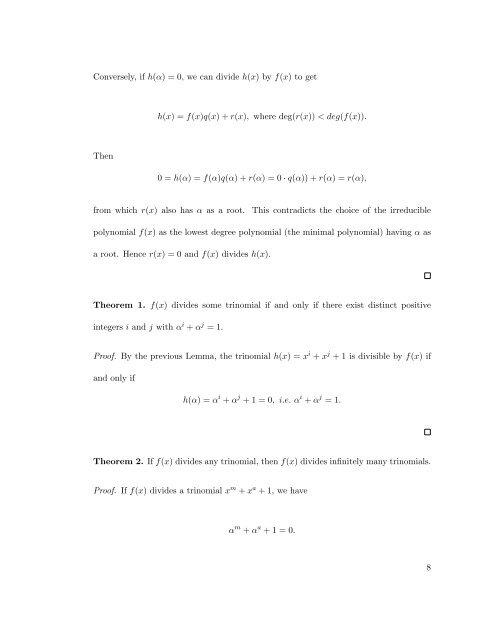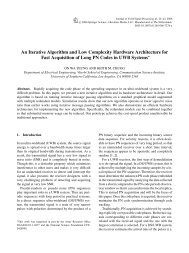Irreducible Polynomials Which Divide Trinomials Over GF(2). - The ...
Irreducible Polynomials Which Divide Trinomials Over GF(2). - The ...
Irreducible Polynomials Which Divide Trinomials Over GF(2). - The ...
- No tags were found...
Create successful ePaper yourself
Turn your PDF publications into a flip-book with our unique Google optimized e-Paper software.
Conversely, if h(α) = 0, we can divide h(x) by f(x) to geth(x) = f(x)q(x) + r(x), where deg(r(x)) < deg(f(x)).<strong>The</strong>n0 = h(α) = f(α)q(α) + r(α) = 0 · q(α)) + r(α) = r(α),from which r(x) also has α as a root.This contradicts the choice of the irreduciblepolynomial f(x) as the lowest degree polynomial (the minimal polynomial) having α asa root. Hence r(x) = 0 and f(x) divides h(x).<strong>The</strong>orem 1. f(x) divides some trinomial if and only if there exist distinct positiveintegers i and j with α i + α j = 1.Proof. By the previous Lemma, the trinomial h(x) = x i + x j + 1 is divisible by f(x) ifand only ifh(α) = α i + α j + 1 = 0, i.e. α i + α j = 1.<strong>The</strong>orem 2. If f(x) divides any trinomial, then f(x) divides infinitely many trinomials.Proof. If f(x) divides a trinomial x m + x a + 1, we haveα m + α a + 1 = 0.8









